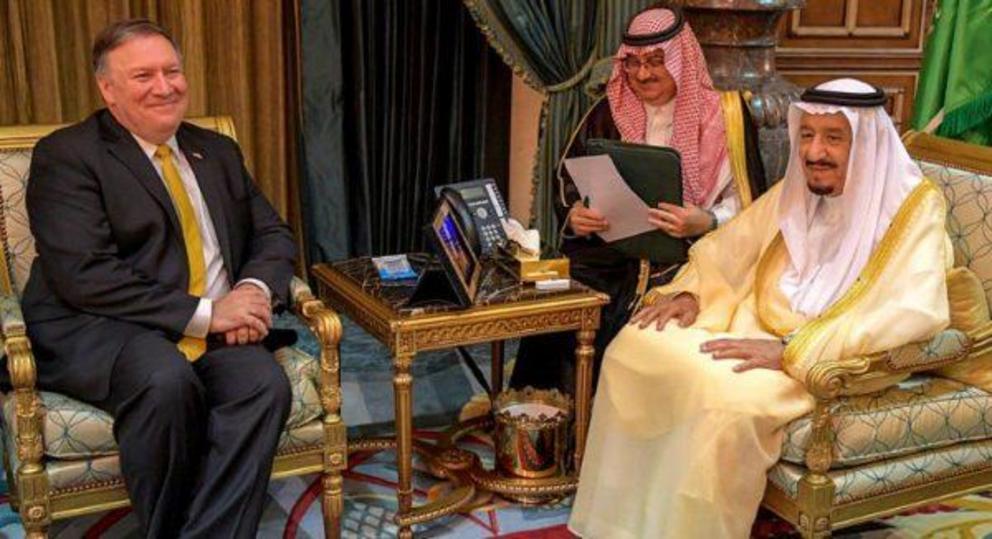US puts ‘rubber stamp’ of approval on Saudi slaughter
... of Yemeni civilians
As local journalists in Yemen reported that at least 15 civilians were killed in Saudi airstrikes in the port city of Hodeidah on Wednesday, U.S. Secretary of State Mike Pompeo officially certified that Saudi Arabia and the United Arab Emirates (UAE), whose three-year assault on the country has been made possible by U.S. support, are doing all they can to avoid civilian casualties.
“The governments of Saudi Arabia and the United Arab Emirates are undertaking demonstrable actions to reduce the risk of harm to civilians and civilian infrastructure resulting from military operations of these governments,” Pompeo said.
The certification was met with anger by lawmakers and others who have demanded for months that the U.S. stop providing the Saudis and UAE with fuel, weapons, and tactical support in the war—with Sen. Bernie Sanders declaring Pompeo’s statement “outrageous.”
“The Saudi-led war on Yemen is killing thousands of people, including a school bus full of children last month,” tweeted Sanders. “America’s role should not simply be to help our Saudi clients manage the slaughter more responsibly; we need to stop supporting it altogether.”
Sen. Elizabeth Warren (D-Mass.) called the certification a “rubber stamp” for a coalition whose attacks the U.S. has steadfastly backed even as it targeted a school bus in a strike that killed 40 children last month.
In an op-ed for Common Dreams following Pompeo’s announcement, Peace Action’s Kevin Martin denounced the decision and called on Americans to divest from U.S. government contractors that have sold weapons to the Saudis.
“The United States is the number one weapons dealer in the world, and Saudi Arabia is our biggest customer, having purchased over $100 billion in armaments since 2010,” said Martin, adding that the bombs in several recent deadly attacks “were built by Bethesda, Maryland-based Lockheed Martin, the world’s largest weapons manufacturer and the largest U.S. government contractor of any kind, with net sales of over $13 billion in just the second quarter of this year. It’s not hyperbole to state Lockheed makes a killing, in more ways than one.”
The war in Yemen has created what the United Nations has called the worst humanitarian crisis in the world. The country is at risk for its third cholera epidemic in recent years; the disease has killed more than 2,300 people there since April 2017. About 8.4 million people are facing starvation, and more than two million are displaced. More than 16,000 people have been killed and injured since the Saudis began their military campaign against the Houthis in 2015, in support of the Yemeni government.
In light of the Trump administration’s clear refusal to confront the affects its support of the Saudis has had on Yemen’s population, Rep. Ro Khanna (D-Calif.) as well as the Yemen Peace Project called on Congress to pass legislation to end U.S. involvement.
“The ball’s in your court, Congress,” wrote Stephen Miles, director of Win Without War, on social media. “Secretary Pompeo and the Trump administration once again prove that they will lie through their teeth and completely ignore all factual evidence to do whatever they want. How will Congress respond?”
Yemeni reporter Shuaib M. Almosawa, based in the capital city of Sanaa, noted that as Pompeo was making his statement, more Yemeni civilians were reported killed in the latest airstrikes in Hodeidah.
Meanwhile, Gregg Carlstrom, Middle East correspondent for The Economist, drew attention to Pompeo’s certification as just the latest evidence that the Trump administration is intent on alienating the U.S. from the global community—declaring itself and its allies as within their rights to conduct international wars as they see fit while tearing up painstakingly formed agreements like the Iran nuclear deal.

